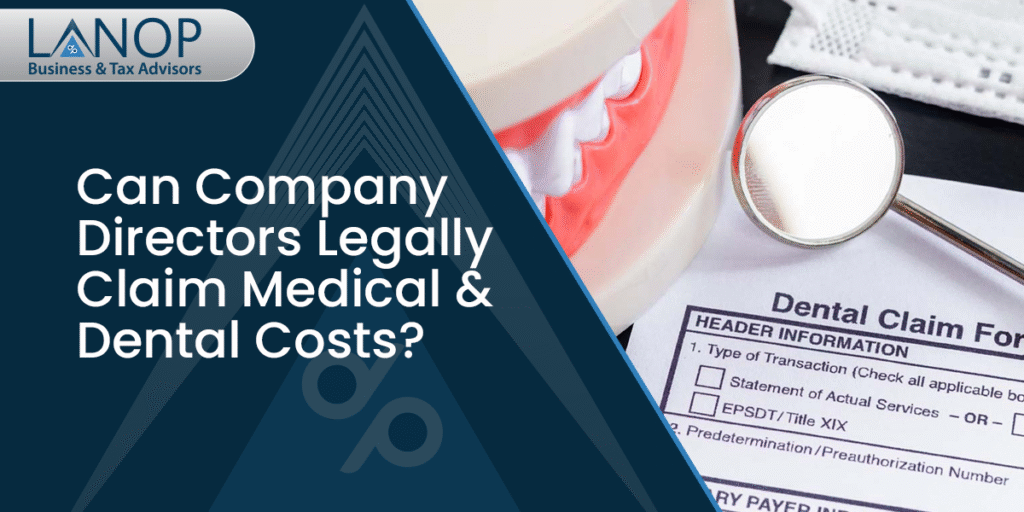A Director’s Dilemma
Sarah, a dedicated director of a small UK limited company, sat in her dentist’s chair one Tuesday morning, facing a surprisingly large bill for a root canal treatment. As she signed the receipt, a question surfaced in her mind. Could her company pay for this dental treatment and treat it as a legitimate business expense?
Later that month, when she also faced minor medical costs for a flu treatment, the same thought returned. Could she legally claim medical & dental costs through her company without facing tax issues?
This question is not uncommon among business owners and directors who wish toHow Company Directors Can Legally Claim Medical & Dental Costs make the most of their company’s financial structure. On the surface, the idea seems simple: the company pays, and everyone benefits. But as Sarah was about to discover, the line between business expense and personal benefit is much finer than most realize.

Understanding the Real Issue Behind Health-Related Business Expenses
At first glance, paying personal health costs through the company might appear efficient. However, tax authorities view such payments with strict scrutiny. For an expense to qualify as business-related, it must be incurred wholly, exclusively, and necessarily for the purpose of running the business.
That means the cost must directly relate to the performance of the director’s duties. Most medical and dental costs don’t meet this test because they are personal in nature. The benefit of good health extends beyond work life. So, when the company pays for these expenses, it’s often viewed as a benefit in kind, not a deductible business expense.
When something is treated as a benefit in kind, the company must report it, pay Class 1A National Insurance, and the director pays personal tax on the value.
For directors like Sarah, that can turn a seemingly simple payment into a tax burden rather than a saving.
When Can a Director Actually Claim Health Costs?
Despite the restrictions, there are some specific scenarios where directors may legally claim medical & dental costs through their company. These situations are limited but important to understand.
1. Work-related illness or injury
If a director suffers a health issue directly related to their work duties, such as an accident at a business site or injury during a company-related task, the cost of medical treatment may qualify as a legitimate business expense.
2. Overseas medical care linked to business travel
If a director must travel abroad for business and falls ill while away, the company can sometimes cover the cost of medical treatment. These costs may qualify under the “wholly and exclusively” rule because they are incurred due to business duties, not personal choice.
3. Preventive health checks
A company may provide one annual health screening or medical check-up to its employees and directors without it being treated as a taxable benefit. The key is that the scheme should be offered company-wide, not exclusively to the director.
However, even in these cases, directors must maintain detailed documentation, receipts, treatment records, and board resolutions to justify the claim.
The Challenge with Dental Costs
Dental expenses, unlike most other health-related costs, are far less likely to be considered business expenses.
Routine treatments such as cleaning, fillings, cosmetic work, or orthodontics are inherently personal. They do not satisfy the “wholly, exclusively, and necessarily” test because they benefit the individual beyond their professional capacity.
However, there is one narrow exception. If a director suffers a dental injury due to a work-related accident, say, during a company event or while carrying out business duties, the company can potentially cover that cost as a valid business expense.
Sarah’s dentist visit, unfortunately, did not meet these criteria. Her treatment was purely personal and unrelated to her professional role. Her accountant explained that while the company could technically pay for it, it would then be treated as a benefit in kind, resulting in additional tax liabilities.
Navigating the Tax Landscape for Directors
Directors must not only understand what qualifies as a valid claim but also the tax implications of getting it wrong.
When a company pays for medical or dental costs that are not business-related:
-
The expense becomes a benefit in kind for the director.
-
The company must report the payment on form P11D.
-
The director pays personal income tax on the benefit’s value.
-
The company pays Class 1A National Insurance on that same value.
In contrast, if the cost is genuinely business-related (for instance, treatment for an injury sustained during work duties), the company may deduct it as a business expense for Corporation Tax purposes.
Understanding this distinction helps directors make informed decisions before making payments that could attract unwanted attention from HMRC.
The Importance of Proper Record-Keeping
Even when claims are legitimate, documentation is critical. Directors should always keep:
-
Treatment receipts and invoices
-
Evidence linking the treatment to business duties
-
Internal company notes or board resolutions authorizing the expense
-
Payroll records detailing any benefits in kind
Accurate record-keeping ensures transparency and minimizes the risk of disputes with tax authorities.
Sarah’s accountant emphasized that the easiest way to stay compliant is to treat all personal health costs as private unless she can clearly prove otherwise. That advice, though conservative, would save her from unnecessary tax complications.

Common Myths That Mislead Company Directors
Many directors mistakenly believe they can automatically legally claim medical & dental costs just because the company made the payment. The reality is more complex.
Myth 1: “If the company pays it, it’s automatically deductible.”
Incorrect. Unless the cost is wholly and exclusively for business purposes, it remains a personal expense.
Myth 2: “All medical and dental costs are personal.”
Not entirely true. Some are business-related, such as treatment for work-related injuries or health checks provided under a company-wide policy.
Myth 3: “Private health insurance avoids tax.”
If a company pays for private health insurance, the director must usually pay tax on the benefit. The company can claim a corporation tax deduction, but the director still faces a personal tax charge.
Myth 4: “Family medical costs can be claimed.”
These are never allowable. Company funds cannot cover personal or family medical expenses without triggering a benefit-in-kind.
Understanding and avoiding these myths helps directors maintain both compliance and credibility with HMRC.
Strategic Thinking: When Paying Personally Makes More Sense
Even if an expense could technically be claimed through the company, it may not be the smartest option.
Let’s return to Sarah’s story. Her accountant calculated the numbers: if TechWave Ltd paid her £400 dental bill, the corporation tax saving would be minor, but the personal tax and National Insurance due on the benefit in kind would exceed that saving.
In short, Sarah would pay more overall if she claimed it through the company. The smarter approach was to pay personally and reserve company funds for genuine business costs.
This example underscores an important lesson for directors: not every deductible expense is worth pursuing. Sometimes, simplicity and transparency win the day.
Practical Guidelines for Directors
If you are considering whether you can legally claim medical & dental costs through your company, follow these principles:
-
Assess the connection: Is the cost truly necessary for your business duties?
-
Document everything: Keep all receipts, notes, and records.
-
Plan: Establish a clear health expense policy for your company.
-
Consider tax implications: Calculate whether any potential tax benefit outweighs the administrative and reporting costs.
-
Seek professional advice: Consult your accountant or Tax Partner before making health-related claims through your business.
Balancing Benefits and Compliance
The ability to legally claim medical & dental costs as a company director comes down to two things: justification and evidence. Directors must be prepared to show that the cost was essential for their business duties.
Paying for private medical insurance or occasional preventive health checks can be structured tax-efficiently, but only with careful planning. Directors who assume that all health-related costs are fair game risk costly tax surprises.
Conclusion
For most company directors, the question isn’t just whether you can legally claim medical & dental costs, but whether you should. The reality is that most such expenses are personal, not business-related. Only in rare cases, such as work-related injuries or mandatory health screenings, can they be claimed legitimately.
A smart director focuses on balancing personal well-being with tax efficiency. Working with a qualified Tax Partner like Lanop Business and Tax Advisors helps ensure that your claims are compliant, strategic, and beneficial to your company in the long run.
In the end, the key lies in understanding the purpose behind every expense. If it serves the company’s business directly, it may qualify. If it serves the individual, it should be treated as personal. That clarity is what separates responsible directors from those who unknowingly invite tax complications.
Explore: https://regic.net


